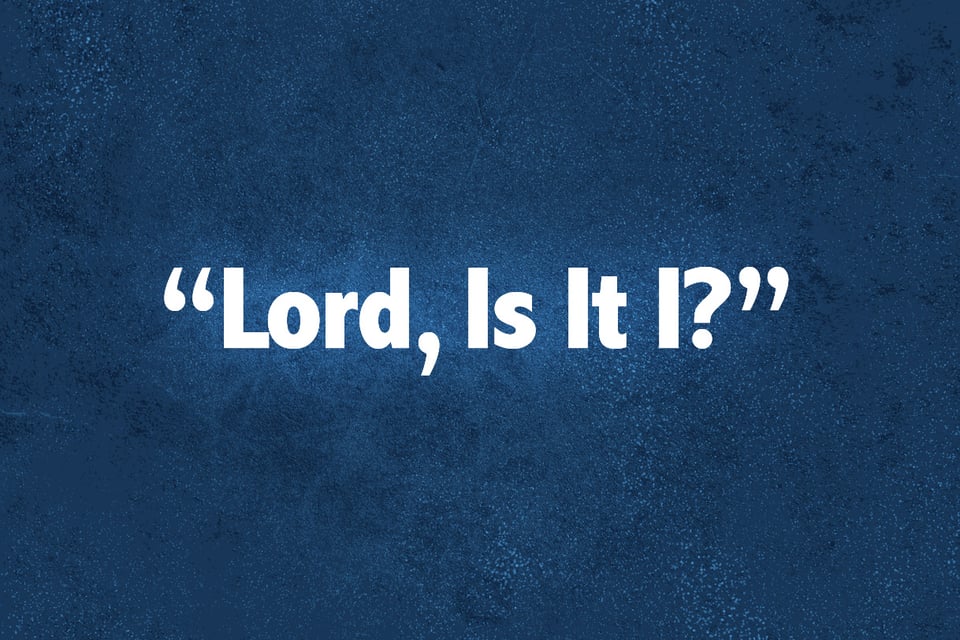“Lord, Is It I?”
Written by Kristen Brunner
At His last Passover, Jesus told the disciples that one of them would betray Him. How they reacted to His statement holds an important lesson for us.

The night Christ gave His apostles the details of His coming crucifixion, He revealed to them a shocking and disturbing truth: the one who would betray Him was among their ranks.
“When evening had come, He sat down with the twelve. Now as they were eating, He said, ‘Assuredly, I say to you, one of you will betray Me.’ And they were exceedingly sorrowful, and each of them began to say to Him, ‘Lord, is it I?’” (Matthew 26:20-22).
When we read this passage, we often focus on Christ’s revelation that Judas Iscariot was the traitor (verses 23, 25). But verse 22 is especially poignant when we consider the question that Christ’s disciples—each of them—then began to ask Him: “Lord, is it I?”
The disciples’ reaction upon hearing this news was apparently not immediate denial, but profound sorrow and self-examination. They appear to have accepted what He said and wanted to know who would betray Him.
Each of them individually began to ask Him if he would be the betrayer.
For the moment, it seems, all the disciples—even Peter, who soon after would emphatically claim that he would never deny Christ even if it meant his death—trusted Christ more than they trusted their own minds.
What an incredible attitude.
An attitude of submission
How many of us today have such an attitude of complete submission to God and deferment to what He says rather than our own perspective? Do we believe God knows us better than we know ourselves?
God’s Word is replete with scriptures that admonish us to have this attitude of absolute faith and reliance on Him rather than our own physical capabilities.
- We are told in Jeremiah 17:9 that our human heart is naturally deceitful and desperately wicked. We must not put our trust in such a heart.
- Romans 8:7 says that the carnal (fleshly) mind is enmity against God. Again, it is a recipe for disaster to trust in ourselves more than God. The carnal mind is contrary to God’s perfect way of life.
- Christ Himself, in the Sermon on the Mount, instructed us not to become so concerned with physical matters that we lose our faith in God (Matthew 6:25-33).
- The book of Proverbs reveals that the way of a man is right in his own eyes, but will ultimately lead to destruction (Proverbs 14:12).
And perhaps the quintessential verse on the subject is Proverbs 3:5—“Trust in the LORD with all your heart, and lean not on your own understanding” (emphasis added throughout).
This is extremely difficult to do!
We are naturally inclined to trust in ourselves, and we don’t naturally put our faith in God. The same mind that is enmity against God encourages us to trust in ourselves and our own abilities, but we see from examples in the Bible (and in our own lives) where that leads. Instead, we must strive to put our faith and trust in God and rely on Him rather than ourselves.
This is a lifelong process. To read more about faith and how to grow in it, see the articles “What Is Living Faith?” and “How to Grow in Faith.”
When we slip up
Even as we grow and mature in the faith, we should work hard at having this mindset.
The disciples were an example of this. Later in Matthew’s account, we read that “all the disciples forsook Him and fled” (Matthew 26:56). These men who had such belief in Christ, as well as trust in and loyalty to Him, failed during an intense trial. But later, after Christ’s resurrection, they proved that despite slipping up, they would stick with the truth and stay committed to the faith:
“Later He appeared to the eleven as they sat at the table . . . So then, after the Lord had spoken to them, He was received up into heaven, and sat down at the right hand of God. And they went out and preached everywhere, the Lord working with them and confirming the word through the accompanying signs” (Mark 16:14, 19-20).
Likewise, we must take heart when we slip up and not allow ourselves to be so disheartened that we give up completely. We must be determined to have this kind of faith. When we occasionally fall short, we should sorrow in a godly manner, as opposed to sorrowing in a worldly manner.
Let each of us have the courage and humility to submit to God fully—to yield to Him rather than the direction of our own minds and hearts. And, when discerning who is wrong in a given situation, who needs correction, guidance and repentance, let’s each be willing to ask, “Lord, is it I?”









